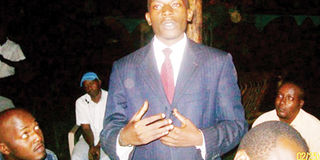Attending the Freethought Club

A member of Freethought Club contributes his views during one of their meetings at Centenary Park.
It was one of those events you’re sure will leave you extremely bored or charged, inspired and thinking hard long after they are gone. I am glad it was the latter, writes Agnes K. Namaganda
I On a warm Thursday evening at Four Points, a joint in Centenary Park, Freethought Kampala was meeting to exchange views on the topic, “Is Religion necessary for Morality?”
On the leaflets given at the entrance, Freethought Kampala describes itself as a club that seeks to bring together freethinkers in Kampala area. And their reasons for forming a club are to encourage the exchange of ideas between freethinkers and to promote reason and critical thinking in this “highly superstitious” society.
“Freethought is a philosophical viewpoint that holds that opinions should be formed on the basis of science, logic and reason and should not be influenced by authority, tradition, religion or other dogma.
Those who attended this particular one were mostly corporately-dressed 20-somethings who seemed like they had walked straight out of an office to the debate. Has freethinking crept in and stolen the hearts of our young while we slept, one would wonder. Well, this notion was dispelled when the discussion started.
Some called themselves free-thinking born again Christians, others seemed against the tag, “free thinkers”, so they were just going by “born again Christians” - there to defend and explain their beliefs against all the verbal thrashing freethinkers seem to mete out and then of course, the freethinkers. Mysteriously missing in action were those from the traditional religions of Islam, Anglican and Catholicism. They probably have no idea such a forum exists or they just can’t handle the viciousness with which this group queries, dissects and examines the intestines of any and all the beliefs.
First of all, most of these people have a verbal proficiency, then they are ready with backing knowledgeable information regarding what they believe and project this with an engulfing passion. It is an interesting debate, foreign though, because your usual religion-abiding Ugandan citizen does not question why things are the way they are. These people are not going to blindly take on what was handed down by their parents; they are going to analyse it and if it is trash, they are going to bin it.
Nothing less.If you’re the kind that’s a little soft-spoken, then you stand the chance of having your opportunity to contribute hijacked by more aggressive debaters who frequently jump in at the mention of anything they find contrary. This had the debate veering off at several tangents as successive discussants kept picking out something to clarify from each other.
It was only when Fat Boy came in that discussants went back to the subject, though he was also guilty of straying some of the time. Otherwise, the whole thing was a mishmash of ideas, though remarkable, strewn all over the place, a weakness that the organisers need to seriously address.
Secondly, each person interested in contributing should be apportioned time and not be interrupted. Thirdly, why did I get the feeling that Fat Boy seemed to address contrary views with a bit of sneer? And then, when persuading one of his own to “say something”, there was no doubt in his tone and body language that he was depending on them to deal his opponents a terrible blow.
Maybe he has believed in this all his life but if he is to have a successful medium for freethinking, as the leader, he must trumpet respectfulness and the skill of listening because like I said, eager to give a view, you could tell that the next discussant had not listened to the previous one, but couldn’t wait to contribute. Well, maybe we all try to defend our corners as fervently as we can and this was an indication.
Three hours later and the topic hadn’t been discussed as thoroughly as was called for but below are some of the tit-bits made by Fat Boy to the effect: “Countries that are less religious are scoring highly on dealing with corruption while the religious are performing very poorly. This shows that religion is not necessary for morality because a 90 per cent religious country like Uganda is very corrupt.
It is equally astounding that Christians hold prayers to pray for the country; why aren’t these prayers working? Why does corruption become worse every day? It is well laid down institutions that will address the problem of corruption and not prayers!”




